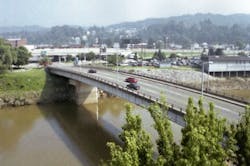The smell of licorice in the air was the first clue that something might be wrong in the Kanawha Valley in West Virginia on Jan. 9. When personnel from the West Virginia Department of Environmental Protection and the state’s Emergency Operations Center investigated, they discovered a chemical spill in the Elk River that runs through the valley.
The leak, which originated from a 48,000-gallon tank at the Freedom Industries chemical storage facility, has contaminated the Kanawha Valley water system used by West Virginia American Water, which supplies water to the area.
The chemical, 4-methylcyclohexane methanol, is used to wash coal and is harmful if swallowed. Residents in Kanawha, Boone, Putnam, Lincoln, Logan, Clay, Roane and Jackson counties were warned not to use tap water by West Virginia American Water.
“Customers should not use their water for any purpose. Bottled or alternative sources of water should be used for drinking, making ice, brushing teeth, washing dishes, bathing, food preparation, baby formula and all other purposes until further notice,” West Virginia American Water said in a post on its Facebook page. “Water quality specialists continue to monitor water, and crews will conduct flushing throughout the distribution system. West Virginia American Water will inform you when it is determined that the water is once again safe to use.”
Gov. Earl Ray Tomblin on the evening of Jan. 9 issued a State of Emergency for Boone, Cabell, Clay, Jackson, Kanawha, Lincoln, Logan, Putnam and Roane counties. Residents served by Lincoln PSD, Queen Shoals PSD, Reamer PSD, City of Culloden PSD, and City of Hurricane PSD also are affected.
“Right now, our priorities are our hospitals, nursing homes, and schools,” said Tomblin. “I’ve been working with our National Guard and Office of Emergency Services in an effort to provide water and supplies through the county emergency services offices as quickly as possible.”
On Jan. 10, President Barack Obama declared an emergency exists in the state of West Virginia and ordered federal aid to supplement state and local response efforts due to the emergency conditions resulting from the chemical spill. The president's action authorizes the Federal Emergency Management Agency (FEMA) to “coordinate all disaster relief efforts which have the purpose of alleviating the hardship and suffering caused by the emergency on the local population, and to provide appropriate assistance for required emergency measures.”
Specifically, FEMA is authorized to identify, mobilize and provide equipment and resources necessary to alleviate the impacts of the emergency.
Trouble Just Starting for the Source of the Spill
Gary Southern, president of Freedom Industries, released a statement Jan. 10, saying that “Since the discovery of the leak, safety for residents in Kanawha and surrounding counties has been Freedom Industries’ first priority.”
He said the company has been working with local and federal regulatory, safety and environmental entities, including the DEP, Coast Guard, Army Corp of Engineers and Homeland Security, and is “following all necessary steps to fix the issue.”
“Our team has been working around the clock since the discovery to contain the leak to prevent further contamination,” said Southern.
He added that at this point, Freedom Industries still is working to determine the amount of 4-methylcyclohexanemethanol, or Crude MCHM that has been released, and that the first priority is safety, containment and cleanup.
Southern’s problems might just be starting. United States Attorney Booth Goodwin announced that his office and federal law enforcement authorities have opened an investigation into the circumstances surrounding the spill. “Yesterday’s release of a potentially dangerous chemical into our water supply has put hundreds of thousands of West Virginians at risk, severely disrupted our region’s economy and upended people’s daily lives,” said Booth. “We will determine what caused it and take whatever action is appropriate based on the evidence we uncover.”
Sen. Jay Rockefeller weighed in, saying, “"I am deeply troubled by yesterday's chemical spill at the Freedom Industries plant in Charleston and concerned about the problems it is causing thousands of West Virginians across nine counties … Along with those at the highest levels of our federal and state government, I am closely monitoring the response.”
And, he added, “Once all of the impacted counties and residents are able to return to a semblance of normalcy, I expect a full accounting of what happened – and what can be done – to make sure this type of disaster never happens again.”
Residents are being told to seek medical help if they are concerned they consumed the tainted water, but officials note that because the chemical was highly diluted in the river, the health impact should be minimal.
West Virginia American Water is working with DuPont, which has operations in the area, and the U.S. Army Corps of Engineers to determine the level of contamination in the water supply and to determine when the water ban can be lifted.
About the Author

Sandy Smith
Sandy Smith is the former content director of EHS Today, and is currently the EHSQ content & community lead at Intelex Technologies Inc. She has written about occupational safety and health and environmental issues since 1990.
